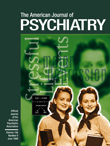Selective Serotonin Reuptake Inhibitors and Delusional Depression
To the Editor: We are writing to express our concern regarding two articles from the same center by Flavia Gatti, M.D., and colleagues (1) and Raffaella Zanardi, M.D., and colleagues (2) that concluded that selective serotonin reuptake inhibitors (SSRIs) alone are effective in the treatment of delusional depression and that “a new window has opened in the pharmacotherapy of this disorder.” Although serotonin has been implicated in the pathophysiology of delusional depression (3), we do not believe that the evidence in the literature supports the use of SSRIs alone for the treatment of delusional depression at this time. Yet some authors (4) are citing these two articles as evidence to argue that SSRIs may be neuroleptics.
The double-blind comparison of sertraline and paroxetine (2) found response rates to sertraline alone higher (75%) than those observed in studies with a tricyclic antidepressant alone (40%) (5) and comparable to the rates observed with ECT (6), a triclyclic antidepressant plus an antipsychotic (5), and an SSRI plus an antipsychotic (7, 8). Is this possible? Had a control group been included in the study, the question of whether SSRIs alone are effective in delusional depression could have been answered. Without a control, it is impossible to draw conclusions.
We wonder if the patients were misdiagnosed. Did they have strictly defined major depression with psychotic features, or did some of them have body dysmorphic disorder, obsessive-compulsive disorder, or borderline personality disorder—disorders that may be characterized by depression plus delusional or near-delusional beliefs or other psychotic or psychotic-like symptoms that preliminary evidence suggests may respond to SSRIs alone (9–11)? It does not appear that a standard diagnostic instrument, such as the Structured Clinical Interview for DSM-III-R—Patient Version, was used to diagnose subjects’ disorders. Finally, while the Dimensions of Delusional Experience Rating Scale has been demonstrated as reliable, to our knowledge, validity data are lacking.
The findings of Dr. Gatti and colleagues (1) and Dr. Zanardi and colleagues (2) are interesting and provocative, but given these apparent methodologic limitations and until further confirmatory data are available, we think that their results should be regarded with caution.
1. Gatti F, Bellini L, Gasperini M, Perez J, Zanardi R, Smeraldi E: Fluvoxamine alone in the treatment of delusional depression. Am J Psychiatry 1996; 153:414–416Link, Google Scholar
2. Zanardi R, Franchini L, Gasperini M, Perez J, Smeraldi E: Double-blind controlled trial of sertraline versus paroxetine in the treatment of delusional depression. Am J Psychiatry 1996; 153:1631–1633Google Scholar
3. Schatzberg AF, Rothschild AJ: Serotonin activity in psychotic (delusional) depression. J Clin Psychiatry 1992; 53(suppl 10):52–55Google Scholar
4. Pies RW: Must we now consider SRIs neuroleptics? J Clin Psychopharmacol 1997; 17:443–445Google Scholar
5. Spiker DG, Weiss JC, Dealy RS, Griffin SJ, Hanin I, Neil JF, Perel JM, Rossi AJ, Soloff PH: The pharmacologic treatment of delusional depression. Am J Psychiatry 1985; 142:430–436Link, Google Scholar
6. Schatzberg AF, Rothschild AJ: Psychotic (delusional) major depression: should it be included as a distinct syndrome in DSM-IV? Am J Psychiatry 1992; 149:733–745Google Scholar
7. Rothschild AJ, Samson JA, Bessette MP, Carter-Campbell JT: Efficacy of the combination of fluoxetine and perphenazine in the treatment of psychotic depression. J Clin Psychiatry 1993; 54:338–342Medline, Google Scholar
8. Wolfersdorf M, Barg T, Konig F, Leibfarth M, Grunewald I: Paroxetine as antidepressant in combined antidepressant-neuroleptic therapy in delusional depression: observation of clinical use. Pharmacopsychiatry 1995; 28:56–60Crossref, Medline, Google Scholar
9. Salzman C, Wolfson AN, Schatzberg A, Looper J, Henke R, Albanese M, Schwartz J, Miyawaki E: Effect of fluoxetine on anger in symptomatic volunteers with borderline personality disorder. J Clin Psychopharmacol 1995; 15:23–29Crossref, Medline, Google Scholar
10. Phillips KA, Dwight MM, McElroy SL: Efficacy and safety of fluvoxamine in body dysmorphic disorder. J Clin Psychiatry 1998; 59:165–171Crossref, Medline, Google Scholar
11. Eisen JL, Rasmussen SA, Phillips KA, Lydiard RB, Pigott TA: Does degree of insight in OCD predict improvement? in New Research Program and Abstracts, 148th Annual Meeting of the American Psychiatric Association. Washington, DC, APA, 1995, p 154Google Scholar



